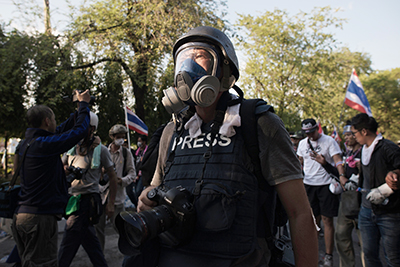Bangkok, December 9, 2013–The Committee to Protect Journalists calls on both Prime Minister Yingluck Shinawatra’s government and opposition groups to respect the role of the press in the lead-up to elections scheduled for February 2. Both sides have failed to uphold basic press freedoms as anti-government protests have intensified in recent weeks, CPJ said today.
Anti-government protests commenced on November 1 after Yingluck’s government passed a controversial amnesty bill through parliament that opposition critics claimed would undermine the rule of law and absolve self-exiled former premier Thaksin Shinawatra of a corruption-related criminal conviction. The protests later expanded into a wider movement aimed at toppling Yingluck’s elected government. In a bid to defuse tensions, Yingluck today dissolved parliament and announced snap elections.
On Thursday, Surapong Tovichakchaikul, foreign minister and head of the government’s Center for the Administration of Peace and Order (CAPO), ordered the arrest of unnamed executives from Blue Sky TV, a station aligned with the opposition Democrat Party, for airing live broadcasts of the protests. No arrests have been made yet.
The National Broadcasting and Telecommunications Commission (NBTC), a state-run regulatory agency, announced on Thursday that it had launched an investigation into recent complaints of sporadic interference in the broadcasting signals of around 20 satellite-based television stations, including Blue Sky TV and the government-aligned Asia Update, news reports said. NBTC Secretary General Takorn Tantasit said that anyone found guilty of jamming satellite signals could face five years in prison under local laws, according to the reports.
Anti-government protesters targeted media perceived as biased against their campaign. On December 1, anti-government protesters amassed around several free-to-air television stations in the national capital and demanded that they air a statement made by protest leader Suthep Thaugsuban, according to international media reports.
Protestors threatened to “black out” Thai Public Broadcasting Service’s signal if its editors refused to air the statement, according to local reports. TPBS executives agreed to air the statement carried on Blue Sky station in a small box in the corner of its regular broadcast. State-run Channels 3, 5, 7 and Modern 9 all carried the statement under pressure from protesters, according to reports.
“Both sides to Thailand’s political conflict purport variously to be fighting for or defending democracy,” said Shawn Crispin, CPJ’s senior Southeast Asia representative. “They would both go a long way in proving their democratic intentions by allowing the press to report on news events without harassment or intimidation.”
At least one foreign reporter has come under attack. On November 25, freelance photographer Nick Nostitz was accused by anti-government protest leader Jumpol Chumsai of being affiliated with a rival pro-government protest group. He was punched in the face several times by a group of protesters before police intervened in the melee, according to local and international reports.
The Foreign Correspondents Club of Thailand issued a statement on its Facebook page after the assault, saying it “deplores this [attack on Nostitz] in the strongest possible terms and calls upon protest leaders to unequivocally and publicly state that the rights of journalists, foreign or Thai, should be respected.” Protest group leaders later issued a statement in which they apologized “unreservedly.”
